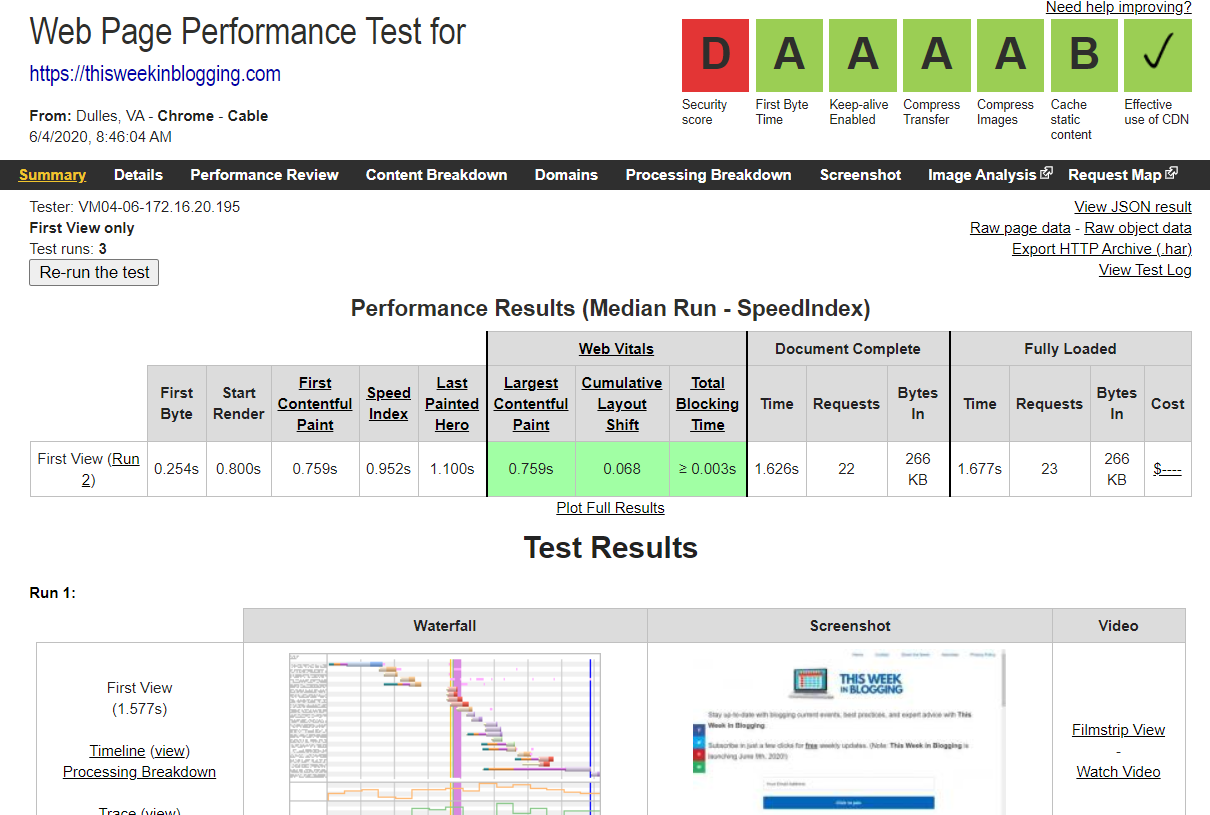Published by Jeremy. Last Updated on July 24, 2023.
Disclaimer: This Week in Blogging uses demographic data, email opt-ins, and affiliate links to operate this site. Please review our Terms and Conditions and Privacy Policy.
When we think about blogging goals, some common thoughts begin to appear.
I want to make $[X]/month.
I want to get on Mediavine.
I want to quit my day job.
These are all great goals that bloggers can and should strive for when turning their blog into a business. But when it comes to your blogging end game, these are not the end but rather a stepping stone to a full and (hopefully) long career creating content for yourself.
In this one, we want to look past these goals and think about the end. The biggest and most likely, final goal you may have with your blog. It is only when thinking about an endgame that you can work backward and figure out the steps you need to take to get there- so let's talk about some of the biggest things worth thinking for each case!
Working Full-Time Until a Proper Retirement (Or During!)
For many bloggers, especially those who haven't considered what their endgame is just yet, a popular final goal is simply working on your site full-time until you have enough money that you can retire. In other cases, blogging full-time is a quasi-retirement already- something that will continue even if you don't necessarily have to be working on any given day.
We're going to look at these two cases similarly because they simply have a common trend that you have made enough money via your blog for your long-term financial well-being.
If this sounds like a case you would want to fall into, what should you be doing now to get set up for success in the future? Well, there are several ideas:
First, start investing in a retirement fund now. Many sources say you need to cap your draw-down rate to about 4% per year. So working backward, you can estimate how much you need to invest with nominal growth to reach that target for your ideal retirement age.
- You may want to do a few forms of this calculation, with varying investment growth rates (3%, 5%, 10%, etc) and whether or not you may want to try and keep a blog income stream going.
Part of this is by necessity. If you calculate what you may need for retirement and work back to what you can save now, you may find some issues- namely that you need to save more. This may be a kick in the gut, but it is also a good motivator to start projects now that can pay off later to allow for greater savings.
We've done it by creating new sites, building new projects on an existing site, or getting certifications so we can increase our authority or ability to make more money as time goes on. But many of this only came about simply because we could tell we were not saving nearly enough to be on any formal retirement track.
Second, on the work side of the spectrum, blogging until retirement is, for most of us at least, a multi-year if not multi-decade timeline.
This is where things can get really tricky if only because blogging is an inherently volatile industry. Algorithms change, social networks come and go, and what may be earning us money now will most likely be replaced by something new altogether later.
As such, for those who intend for their end game to be part of the long haul, keeping abreast of how the industry is changing and evolving, staying on top of your game, perhaps launching new projects and ventures to weather any storms, getting subscribers off social networks and onto lists you own (i.e. newsletters), are all points to keep in mind as the years go by.
Thankfully, we'll still be here at This Week in Blogging to track news developments as they come, so make sure you're signed up for our newsletter to stay up-to-date in all things blogging.
Selling and Taking a Pay Day for Retirement
Another potential endgame scenario is building your blog up until you can sell it and, with enough profit, live off of the income of the sale (plus any savings) and enjoy retirement however you want.
The problem here is simply having a large enough blog that makes this one feasible outright.
Most blogs generally sell for about 2-5x annual profits, which, as you may expect, isn't really that much. Selling a site earning $50,000/year profit for $200,000 is a solid payday if you can get it, but is it enough to retire on? Well, that is a much more personal question to answer.
If you are working towards the first case mentioned above, where you are saving up for a proper retirement year in, year out, perhaps that extra chunk of change gets you over the edge to retire tomorrow instead of five or ten years from now. Letting go of your blog to leap into retirement a decade earlier than you anticipated is one potential endgame and one that is feasible for many.
But on the flip side, if your blog is large enough that you could potentially sell it, fund your retirement completely, and ride off into the sunset, a reverse issue may also present. Let's say you are targeting $1,000,000 to retire on. If your blog sells at 2-5x annual profits, this likely means that you are earning $200,000-$500,000/year in profit already.
I don't know about you, but I could enjoy virtually all of my retirement goals on that income as it stands, so unless I was working insane hours, incredibly bored, or thought extreme changes to blogging as an industry were incoming, parting with that annual revenue stream for a lump sump could be a hard ask.
If selling sounds like a case you would fall into, there are some things you may want to be thinking about to work towards this goal:
First, many bloggers may be a bit possessive of their first blog as it is, quite literally, your baby. But a second, third, or fourth blog designed purely to be sold at some date in the future? Well, now you have a business-oriented decision that may be much easier to make.
Second, we have personally discussed this topic with firms that buy blogs, and the three biggest takeaways we learned are that profits, ease of operation, and consistent revenue are what truly matter. For some niches, the ease of operation bit becomes a problem.
Let's say you have a popular local blog covering a city. Creating content locally typically requires someone to live in (or near) the city. A buyer half the country (or world) away is not going to be able to do this easily. This drives the sales multiplier down as they need to find a writer who lives locally, which will ultimately eat into profitability.
But let's say you have a team of writers working for you who are already trained and live in your city. This may eat into your net profit as well, but you could be able to negotiate a higher multiple if your site is getting to the point where it could run itself without you. (Having a product is another idea. Relying on passive income streams is another. We could go on.)
The point here is simply that you may need to take a step back and look at what it would take to generate profits if a new owner was not in your niche, geographical area, or trained in your business in the slightest. The easier you make your site make money for this fictitious buyer, the more you may possibly make from a sale.
Finally, buyers often want to see several years of consistent revenue, too. So any changes you make that could impact your revenue will likely need a decent track record to show their value to any would-be buyers to get that multiple up!
But if you get there, all you have to do is then throw that money into your (hopefully already sufficient) pot, and your end game will approach all the sooner.
Selling and Taking a Pay Day for Future Ventures
When it comes down to it, very few bloggers sell their websites and head straight into retirement. As mentioned above, if you can make enough money from a sale to retire, you'd probably make enough annually to have a good quality of life anyway.
What is far more common for a blog's end game is simply an intermediate payday that you can subsequently use for your next venture.
There are an untold number of reasons why you may want to sell a blog that does not involve retirement, including increased competition in the niche, decreasing revenue streams, concerns about the longevity of blogging as an industry, or, in some cases, simply getting bored of the topic (or blogging!) outright.
Selling a site for a payday could be enough of a financial investment to get your next big thing off the ground or, alternatively, float you while new projects are in their growing phase. We know many bloggers who have gone this route simply because they wanted to jump back into the corporate world, have a steady paycheck, and get a nice little payout while their site still had appreciable value. The sky really is the limit here!
In this particular instance, the end game is not so much for you but for your blog. Although the steps you may take for this one are similar to the retirement case above, there are a few differences worth noting.
First, you should have a clear understanding of what your next phase will be. Getting out of blogging and back into corporate life is a black-and-white decision. Using funds from a sale to float a new project- not as much.
If your new project is another blog, we are all keenly aware of how long a site may take to become profitable. Those who do everything right, have the best timing, a modest marketing budget, and a bit of luck can build traffic in a matter of months. Throw in one or two kinks, and that timescale could be one year, two years, or more.
So if you are selling a blog to fund a new venture, keep in mind the expenses may have to cover your marketing for the new project and your living expenses in the interim!
Second, and our preferred case, is to try and juggle your new venture with your old before selling if time allows. Simply put, this one is a bit more of a hedge as it could allow you to build a new brand while maintaining profits from the original. At some point the new venture can become profitable, your old one can then be sold, and you have a much stronger safety net along the way.
Although this case may not be ideal for everyone, as some new ventures may require a significant upfront cost that only a sale could provide, it is worth highlighting the possibility all the same.
Expanding and Hiring Staff for the Day-to-Days
Another endgame for the savviest business minds is to grow so that your blog can operate profitably without your involvement (or, at minimum, only working on the tasks you personally enjoy).
You know it, I know it, we all know it- some day-to-day blogging tasks can get old quickly and may not have the most significant ROI for your time. After running my first blog for almost 15 years, I have a long list of things I know I should be doing but don't want to do because I'm sick of it. Social media, I'm looking at you. Truly, on that site, all I want to do is write.
Delegating tasks to others is a great way to ensure the work still gets done while freeing up your schedule to do what you enjoy (or make the most money from!).
This end game is almost the reverse of the above points as, instead of selling, you make the brand work for you even when you're not. But there are several things to keep in mind here.
First, having staff (be it simply a VA all the way to full-time employees) requires training. For some this can be a long, time-consuming, and even frustrating process as tasks become delegated to others with varying degree of results.
Second, how much you can delegate depends on how much control you wish to have and if your brand allows it on any given task.
My local blog is a good example because I've incorporated myself and my wife in the branding. We do everything personally. Our readers know this, and we've built our brand around it being solely us. Growing to incorporate others may either be relegated to behind-the-scenes activities or require changing my brand structure entirely. I'm not against this, it will just require far more upfront work.
Third, there is paying your employees. Are you going to hire someone around the world simply because the salary is far cheaper than in your locality, are you going to hire an employee nearby, or who is an expert in the field? Are you going to be paying above market rates or not? What about benefits? Will they be full-time, part-time, or contract?
All of this pushes towards business plan territory, so if you're looking to hire it is probably best to put pen to paper and write down your wants, needs, and goals and then work backward to figure out who can do them, how much time they need (plus how much time this could free up for you!), and of course, how much you are willing to pay for it all.
Whether you outsource some functions simply to allow you to spend more time on things that you enjoy or maximize revenue, or simply because you want to walk away and still let your business earn in the background is up to you. In either case, delegating work to others to free up your own time is one solid endgame to consider.
- Don't forget, sales multipliers often go up if you have a business that can be run mostly hands-off. So even if your goal may simply be more time or to work on things that make more money to you personally, this is a possible tangential benefit from hiring not to overlook!
Letting the Blog Go Quietly Into the Sunset
Finally, we have another blogging endgame that happens far more than we would like to admit- letting your blog fall by the wayside.
Much like selling your site, there are far too many reasons why bloggers simply let their website go. Not finding success fast enough, getting another opportunity outside of blogging, having a new idea to pursue, being hit by a crippling algorithm change, or boredom are all very real possibilities that can and do happen to bloggers regularly.
When these issues happen, the two most likely scenarios that follow are that the blogger simply doesn't renew their domain/server or, if they do, they slow down to the point that the blog is effectively permanently dormant. In the first case the website is here today, gone the next. In the latter, publishing goes from weekly, to monthly, to yearly, and then more or less defunct while technically still existing.
If your blogging end game comes to this point, there is one element worth keeping in mind before closing shop completely- are you still making a profit?
For those who are not, canceling the bills may make sense (although you could still try to sell the domain!). For those that are, even to a slight degree, keeping the site live could still be a good decision simply because passive income could continue for months, if not years, after a final post is published.
Yes, it will drop- $1,000/month will turn to $500/month, will turn to $100/month, and ultimately will drop to $10/month or less- eventually. But if your alternative is simply closing now, keeping it live to milk the last penny of profit is an idea still worth considering. We know bloggers who still make several hundred dollars per month on sites they stopped updating years ago simply because of passive traffic and income sources!
That said, for all those in this boat, if your starting income stream is still high and you are seeing the signs that you are tapping out, selling could be a better decision if your timing is right. That $1,000/month income earner sold at a 3x multiple may yield $36,000 if sold today, but if your income drops by 50% YOY you may only make $24,000 over the next 10 years!
The problem here is that it is hard to predict what kind of earnings decay you could see. Blog A may stop publishing and lose 90% of its revenue in the next Google update. Blog B may have a slow decay of 10-20% YOY such that they could even earn more just holding onto the site over the next 10 years. It really is that variable.
Ultimately, this becomes a sign of simply recognizing that you have already reached the end. Catch it early, and you may be able to take some profit via an upfront sale. Catch it late after a period of inevitable decay? Well, there is still no harm in selling but perhaps holding on until the inevitable happens may not be a terrible idea to make a bit of money every month, either.
Overall, these are a few blogging end games that many bloggers look at for their blogs. Although there is no right or wrong answer for what you may do personally, the main takeaway we want to impress upon you is that endgames do not happen overnight. They may require many years of work, and only in knowing your end game now can you start working toward the future you want.
What is your blogging end game? What steps are you taking to reach your goal? Comment below to share!
Join This Week in Blogging Today
Join This Week in Blogging to receive our newsletter with blogging news, expert tips and advice, product reviews, giveaways, and more. New editions each Tuesday!
Can't wait til Tuesday? Check out our Latest Edition here!
Upgrade Your Blog to Improve Performance
Check out more of our favorite blogging products and services we use to run our sites at the previous link!
How to Build a Better Blog
Looking for advice on how to improve your blog? We've got a number of articles around site optimization, SEO, and more that you may find valuable. Check out some of the following!















